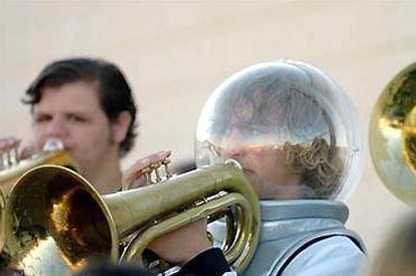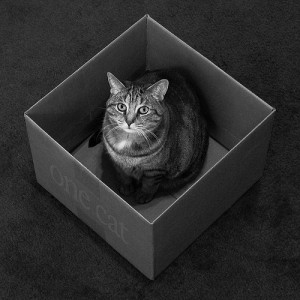No One Would Ever Say That
[Much thanks this morning to Elisa Gabbert, who sends thoughts on plainspokenness. – BB]
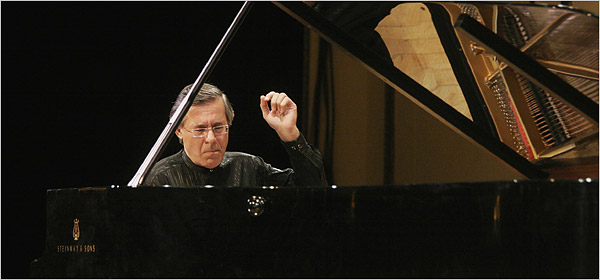
Over at the new Ploughshares blog (I wrote for it back when it was a humble blogspot), Peter B. Hyland is talking about accessibility and the closely related (in poetry at least) matter of “plainspokenness,” as “plainspoken” poets (such as Billy Collins, he offers) are less intimidating and considered “more convivial.”
It’s a familiar idea that poetry should sound like speech. But Hyland doesn’t claim this; instead, he suggests that “maybe there’s no such thing as plainspoken poetry,” using “The Red Wheelbarrow” as an example of a seemingly plainspoken poem that doesn’t really sound like how people talk.
This reminded me of a post I read years ago (in 2007) on Jonathan Mayhew’s blog:
I learned something quite significant from this. I learned that C Dale Young and I do not speak the same language, poetically speaking. I searched through a recent poetic sequence of mine, The Thelonious Monk Fake Book, to see whether I use words like dark, sadness, chest, hands, water, rain, body, silence. Generally, I don’t use these words very much if at all. Where my vocabulary coincided the most with his was in an Ira Gershwin lyric I happened to be quoting at one point. “Holding hands at midnight , ‘neath the moonlit sky.” I did use “blue” a lot, but that was quoting the titles of Monk tunes, mostly.
It’s no criticism of C Dale’s excellent book of poetry of course to say that I simply couldn’t bring myself use words like that (very much). To me they are *poetry words.* In other words they might correspond to what the average person expects to find in a poem. I don’t like depending on an identifiably poetic tone. On the other hand I’m sure my own *poetry words* would be just as embarrassing, if I knew what they were… If I did know I’m sure I would be obliged to ban them, viewing them as crutches that I was better off without…
5 Glots of Snoo
1.) We would rather watch art made than the art itself.
Doesn’t work for books.
“Hey, wanna come over and watch me write?”
“I would rather shoe a snail.”
2.) mud luscious press has a nifty submissions process and a sale. Why not use both?
3.) Aimee Bender interview.
4.) There is a better word than the one you have down. That’s a problem but a koan type of problem. Eventually, you will stop and settle on one word (not the best word). Why? Why then? Is it maddening or gladdening to go through this process? Define the term strike. I thank you.
5.) Just got Ander Monson’s Vanishing Point in the mail! Holy shit. This book bleeds over into the web and then the web bleeds back. More on this later. Monson’s not only ahead of the curve, he’s troweling the curve for us, cut, tamp, curl.
Dear HTMLGIANT,
I miss you!
There’s an essay about sound and syntax in Plath’s poem “Nick and the Candlestick” in the latest Writer’s Chronicle. I haven’t read it. But I will on my way to Atlanta today. “Nick and the Candlestick” is one of my favorite Plath poems. Her line breaks fuck shit up.
Here’s a taste:
Old cave of calcium
Icicles, old echoer.
Even the newts are white,Those holy Joes.
And the fish, the fish—
Christ! they are panes of ice,A vice of knives,
A piranha
Religion, drinkingIt’s first communion out of my live toes. …
Trash
What makes a work unpublishable? Ubu Web invites 50 authors to answer this question.
Read a conversation over stolen food by John Cotner and Andy Fitch, a handwritten letter to her father by a young Mary Jo Bang, Christian Bok’s proposal for nanoscopic poems,some language dissolutons that end in a review of Lou Reed by Alan Licht, and lots lots more.
The web is a perfect place to test the limits of unpublishability. With no printing, design or distribution costs, we are free to explore that which would never have been feasible, economically and aesthetically. While this exercise began as an exploration and provocation, the resultant texts are unusually rich; what we once considered to be our trash may, after all, turn out to be our greatest treasure.
Attitudinal altitude

A 6th grade teacher who marked 20% off a student’s assignment “for being a loser” says he was joking, that it was some kind of informal ingratiation used to relate to the student. Herein lies the trouble with rhetoric, or purposeful irony, because intent is something earned in the reader, never intrinsic to the inception of the writing. In reading random articles’ comments about this story, I was struck by the abundance of caps. Of the passionate folk:
Thought Experiments
If you had to go to a party dressed as the last animal you killed, what would you go as? I’d probably go as a newt, or if that newt didn’t die, then I’d be a fruit fly. Schrödinger either would or wouldn’t be a cat, depending on something random.
At least one person has said that much of modern physics is built on thought experiments. Einstein’s thought experiment about chasing a light beam got him to his theory of relativity.
Do you use thought experiments, or something like them, in your writing? Or, another way: how do you make environments using language?
P.S. It isn’t new, but check out “Keats in Space” by Molly Young for a discussion of the fusion of poetry and science. Also, Natalie’s poem “Water Experiment” and the discussion that follows gives you some poetry and science.
Monoculture Culture
In her essay “Points of Pressure,” Caroline Bergvall writes:
For many bicultural artists and writers, the processes of identity and of writing acquisition go hand in hand with aspects of cultural belonging and the way this articulates their lived body and speaking voice. When the writer’s cultural and social body accommodates two or three languages and/or cultures, their inscriptive narratives and poetics are necessarily at a break from a monolingual textual body-type and a nationally defined writing culture. It is often accompanied by a propensity towards open-forms and mixed genres, remains dubious and questioning of defining terms, can be resistant of exile or immigrant narratives and their inward longing for a traditionalist past where identities are firmly locked in place, rather than in play.
Cannibalisms, from Mark Gluth

Thoughts today via our Giant friend Mark Gluth:
The pest control guy told me about rats that cannibalize dead rats. He’s seen cats that eat cats. Then I read about this cannibal star that’s eating a planet. It got me thinking about a ton of stuff, and as per usual I started to think about writing, about how I write, about how much the end results of my writing process are built upon cannibalization of the lesser results of previous processes. About thoughts that kill previous thoughts to give rise to new thoughts.
So here’s my question: When’s the last time you cannibalized a piece of your own writing? When’s the last time you revised a character out of a story but reassigned one of his/her lines to another character? When’s the last time you wrote a 30 page story then edited it down to 3 lines describing a story a character in one of your pieces of fiction wrote? When’s the last time you threw a story out, but reused the title because it was the best part of it?
Gustav Mahler on Writing
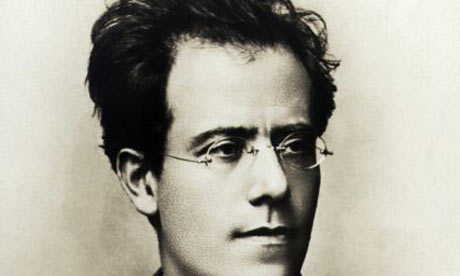
“A symphony must be like the world. It must contain everything.”
“I don’t let myself get carried away by my own ideas – I abandon 19 out of 20 of them every day.”
“Fortunately, something always remains to be harvested. So let us not be idle.”
“I am hitting my head against the walls, but the walls are giving way.”
“Discipline, work. Work, discipline.”
“If you think you’re boring your audience, go slower not faster.”
“The real art of conducting consists in transitions.”
“It’s not just a question of conquering a summit previously unknown, but of tracing, step by step, a new pathway to it.”
“I embark on this enterprise rather like a soldier who shoots arrows into the dark at an invisible target.”
“The degree to which the word sustains the sound can be measured when you pass from wordless music to text.”
“The call of love sounds very hollow among these immobile rocks.”
“The pointer of a pair of scales always returns to the center.”
Writing Prompt: Atonality
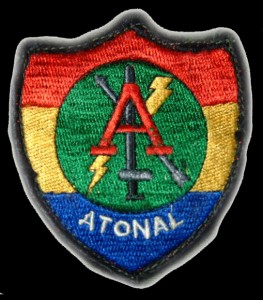 (With this writing prompt, I have provided a badge. When you have completed the prompt, feel free to print out the badge and pin it to your jacket. Or maybe shrink it and turn it into a 1″ button to put on a sweater. Or maybe print it on that iron-on transfer paper and put it on a shirt. Because, good for you! You’ve done a thing someone on the internet told you to do. Good for you!)
(With this writing prompt, I have provided a badge. When you have completed the prompt, feel free to print out the badge and pin it to your jacket. Or maybe shrink it and turn it into a 1″ button to put on a sweater. Or maybe print it on that iron-on transfer paper and put it on a shirt. Because, good for you! You’ve done a thing someone on the internet told you to do. Good for you!)
I’ve been listening to this album by a local band called Friends & Family. It’s free to download. It features a guy singing, sometimes atonally, over samples of easy listening records. I like it.
Here’s what I want you to do: take a familiar story theme. Oh, maybe a love story. Oh, maybe a scary story. Oh, maybe a coming of age story. Oh, something.
Write a familiar kind of story. But write it in the wrong tone. Write a love story in a scary tone. Write a tragic coming of age story in a comedic tone. Write a story about an epic—and completely comic—series of coincidences, but write it in an academic tone.
Write something in the wrong tone, as if you are the sort of person who can’t make accurate judgments about appropriate tone.
And then print the badge.
Go.

